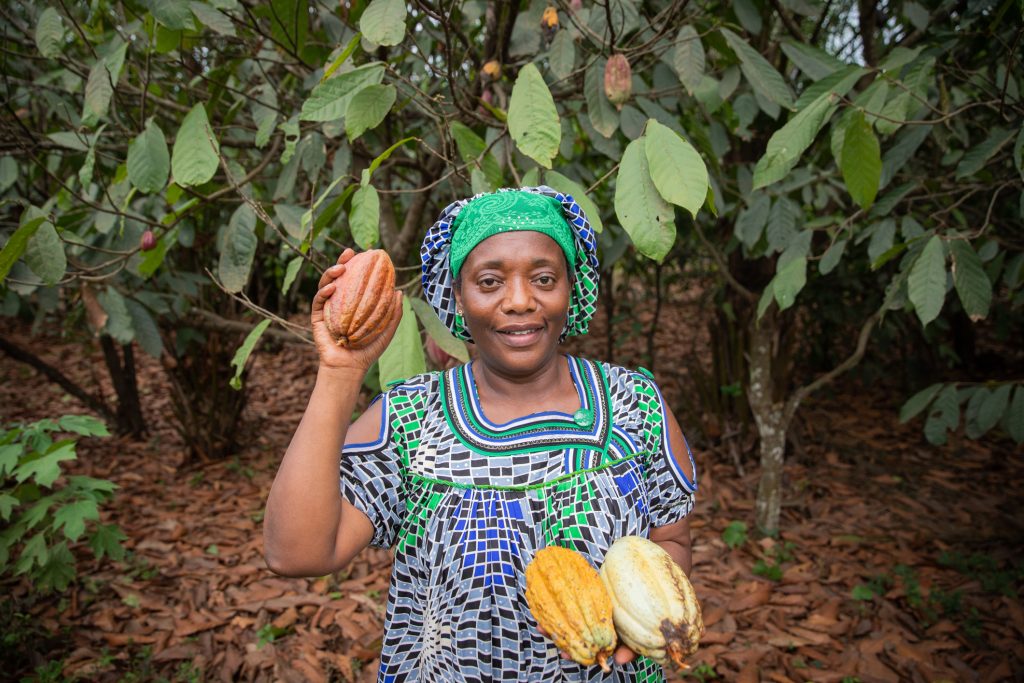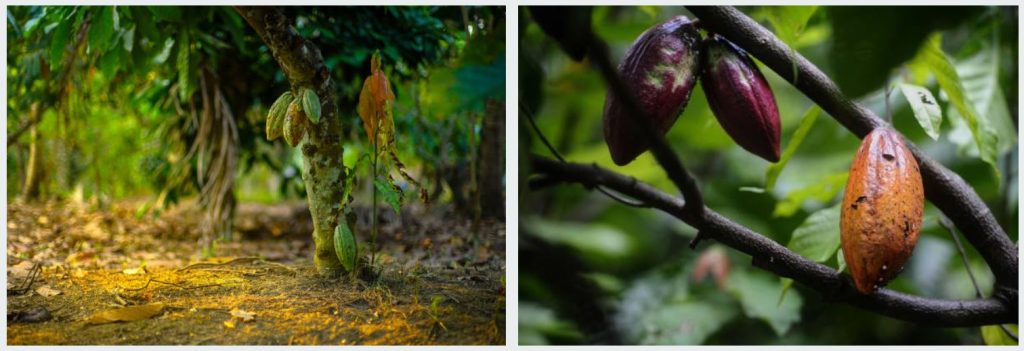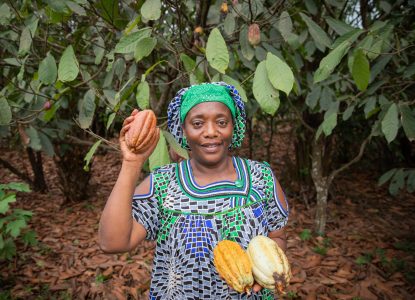By JoAnne Wadsworth, Communications Consultant, G20 Interfaith Forum
– – –
On June 8th, 2023, the G20 Interfaith Forum’s Anti-Racism Initiative, in cooperation with the International Academy of Multicultural Cooperation, held a webinar entitled “Manifestation of Neo-Colonialism—The Case of Cacao and the Dark Secret of Chocolate.”
Speakers included Antonie Fountain, Managing Director of VOICE Network; Lars Gierveld, Co-Founder of Kumasi Drinks; Sam Mawutor, Senior Advisor at Mighty Earth; and Dr. Michael Ehis Odijie, Research Fellow at University College London. The discussion was moderated by Audrey E. Kitagawa, Chair of the G20 Interfaith Forum Anti-Racism Initiative; and Morgana Sythove, Global Council Trustee for Multireligion at the United Religions Initiative.
Audrey Kitagawa began the webinar by welcoming all panelists and attendees and introducing the mission of the G20 Interfaith Forum’s Anti-Racism Initiative in connection to the topic of discussion. She said that early cacao plantations in Africa and Latin America often relied on forced labor and slavery—and that though colonialism has ended and plantations are now managed locally, some damaging neocolonial legacies continue in the trade, including issues affecting both human rights and the environment. She then invited the speakers, experts on various aspects of the cacao industry, to present their thoughts on issues surrounding neocolonialism, human rights, and sustainability in the trade.
Morgana Sythove added that racism is not just a human issue, but an ecological issue, and that massive forest losses in Africa are occurring to make way for expanding production of the cacao industry on the continent, which produces almost 75% of the world’s cacao. She called for restorative healing, both for the people and the forests.

Dr. Michael Odijie
Odijie focused his comments on colonial production modes, and how they are being perpetuated in the cocoa farming industry in Africa. He said control of (and benefit from) an area’s natural resources played a large role in colonization—so when African countries came to the threshold of independence, many African leaders viewed decolonization as a transformation away from the colonial economic model. Many African states, whose economies had been structured purely to produce raw materials and export them under colonialism, faced problems in transitioning away from that into a truly independent economic structure.
In Neocolonialism, Odijie said that colonial production modes continue—with African cacao farmers positioned at the very end of the value chain, using their land and labor to produce raw materials that are manufactured and sold elsewhere. Following this pattern, farmers are bearing two heavy costs:
- The ecological cost: Traditional land is being used for cacao farming and experiencing deforestation at an alarming rate, especially in Cote D’Ivoire. Tensions surrounding the massive influx of migrants into the southern forest land of Cote D’Ivoire for cocoa farming led to the Ivorian Civil War, which resulted in thousands dead and millions displaced. Deforestation is also leading to other issues.
- The social impact and human rights cost: The cocoa prices paid to farmers are insufficient for farmers to pay proper wages, so they often resort to family labor, child labor, and slave labor.
He said that true decolonization would imply one of two options:
- Encouraging local cocoa processing companies and chocolate manufacturers to bring the whole value chain home, along with better wages for farmers
- A complete move away from cocoa farming, transitioning to products more beneficial to local needs in Africa
“Ecological costs and social impact are not factored into the price of cocoa beans. So those on the other end of the value chain reap most of the benefits while Africa bears most of the cost. Stakeholders are currently either supporting decolonization or neocolonization. There is nothing in between.”
Sam Mawutor
Mawutor centered his thoughts around the history of the cacao industry in Ghana and the importance of including farmer’s voices at the table. He said that cocoa first came to Ghana in the early 1800s, and the country’s farms quickly gained the attention of large European manufacturers like Cadbury who were trying to extricate themselves from slavery in other African areas after the transatlantic slave trade was banned. As Ghanaian cocoa was being produced by free farmers, European attention shifted there.
Initially, farms were run mostly by household labor and migrants, intercropping cocoa with their own food. Local farmers already had expertise and skill, and were resistant to the advice of colonial producers, but eventually colonial attention and control spread cocoa to most parts of Ghana. In 1947, just before Ghanaian independence and in the name of helping farmers, the colonial government formed the Raw Cocoa Board, which Mawutor said continues as a big manifestation of neocolonialism today, clashing with the farmers and acting as a middleman instead of being on their side.
Today, Mawutor said “Cocoa is Ghana and Ghana is Cocoa.” The university he attended was funded through cocoa farmer’s income, as are many of the roads, hospitals, and public facilities in cities. But the benefits of the industry seldom get back to the rural areas where the farmers themselves live, and their voices are seldom heard.
“It’s baffling that we are always wanting to solve the problems with the industry at the farm level, but we’re also wanting to increase production. The voice of the farmer is not heard in international discussions on cocoa, but we expect them to fix the issues. They aren’t heard because they don’t understand what’s going on in the industry at large—and that puts them at a position of disadvantage.”

Antonie Fountain
Fountain chose to focus his comments on the role of people in the global north in decolonization and moving away from neocolonial structures and practices. He began by encouraging care when using the term ‘modern slavery’ in African contexts, as those in the global north don’t feel that historical injustice and pain in the same way that people in Africa do. In the same vein, he emphasized listening to the voice of those in the global south about whether or not our interventions are helpful or harmful.
“We may have ended the official form of colonialism—but if use and exploitation of natural resources is colonialism, it’s still alive today. It’s still a transfer of value from the global south to the global north. In the same way, all of the attempts that have been thrown at the sustainability problem have been decided in Europe and North America, not Africa. We’re still making decisions for them and telling them what solutions would be best.”
He said in one conversation with a local farmer, the man said that all conversations on which fertilizer to use to improve productivity were missing the best fertilizer of all: price. A better price would mean more cocoa per hectare. However, prices only improve when local governments put their foot down and refuse to negotiate.
Fountain said that only 3-5% of cocoa profits go to farmers, and that many of the huge chocolate companies in Europe, who benefit hugely from being at the end of the value chain, could donate full wages to farmers, run a child labor remediation system, and still pay themselves hundreds of millions per year.
“Interventions are always ‘The farmers need to do this differently’—never ‘The multinational corporations need to do this differently in their exploitation of Africa.’”

Lars Gierveld
Gierveld was unable to attend the webinar in person, but he sent a video recording detailing a few of his experiences related to building a sustainable and ethical company based on the cocoa industry in Africa.
As the founder of Kumasi Drinks, Gierveld said he focused on making sure that all of the claims he was making as a brand could be backed in his supply chain. This included teaching farmers to invest their extra money in the farms themselves, utilizing extra money to make more.
“When you do something or start something like this, you of course want to have a feasible and sustainable business, but you also have the responsibility to let your product or intervention be a showcase to spearhead other interventions.”
He said that he’s faced several moral dilemmas, wondering who he is to be making soft drinks out of Ghanian cocoa as opposed to a Ghanaian company, and having to check in on himself periodically to make sure his definition of “helping” people doesn’t become a problem in and of itself.
“When you create movements, you have to think about things that can move people and support the dignity of the people themselves. With Kumasi, I’m aiming for emancipation on both sides—a solidly profitable company, and Ghanian people being able to stand up more for themselves on price for the luxury goods we get there at those cocoa farms. We’re rethinking the world trade market.”
Q&A Session & Conclusion
The webinar concluded with a lively Q&A session, covering topics like whether or not African countries benefit locally from producing cocoa at all, how to improve education in the Northern and Southern hemispheres to prevent neocolonialism, and more. Speakers then offered their concluding thoughts.
To view these sessions, see the webinar recording below.
– – –
JoAnne Wadsworth is a Communications Consultant for the G20 Interfaith Association and acting editor of the “Viewpoints” blog.


